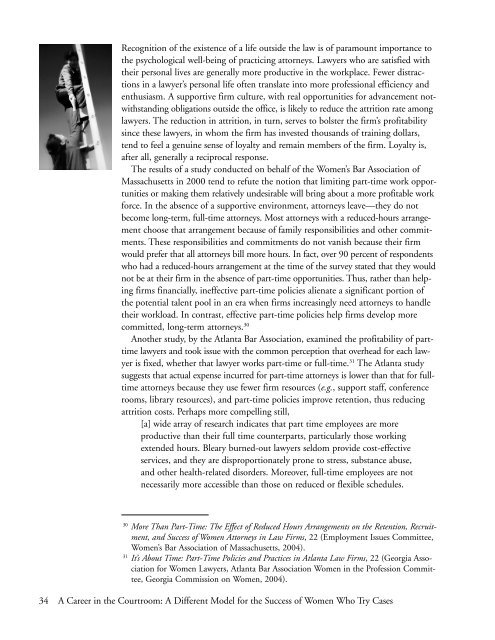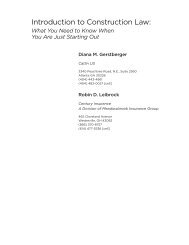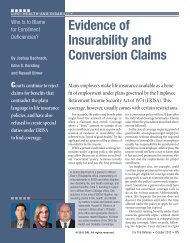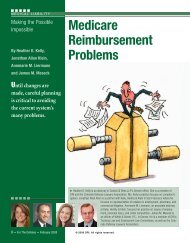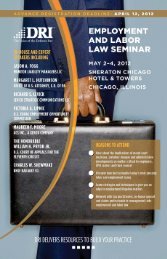A Career in the Courtroom: A Different Model for the Success ... - DRI
A Career in the Courtroom: A Different Model for the Success ... - DRI
A Career in the Courtroom: A Different Model for the Success ... - DRI
Create successful ePaper yourself
Turn your PDF publications into a flip-book with our unique Google optimized e-Paper software.
Recognition of <strong>the</strong> existence of a life outside <strong>the</strong> law is of paramount importance to<br />
<strong>the</strong> psychological well-be<strong>in</strong>g of practic<strong>in</strong>g attorneys. Lawyers who are satisfied with<br />
<strong>the</strong>ir personal lives are generally more productive <strong>in</strong> <strong>the</strong> workplace. Fewer distractions<br />
<strong>in</strong> a lawyer’s personal life often translate <strong>in</strong>to more professional efficiency and<br />
enthusiasm. A supportive firm culture, with real opportunities <strong>for</strong> advancement notwithstand<strong>in</strong>g<br />
obligations outside <strong>the</strong> office, is likely to reduce <strong>the</strong> attrition rate among<br />
lawyers. The reduction <strong>in</strong> attrition, <strong>in</strong> turn, serves to bolster <strong>the</strong> firm’s profitability<br />
s<strong>in</strong>ce <strong>the</strong>se lawyers, <strong>in</strong> whom <strong>the</strong> firm has <strong>in</strong>vested thousands of tra<strong>in</strong><strong>in</strong>g dollars,<br />
tend to feel a genu<strong>in</strong>e sense of loyalty and rema<strong>in</strong> members of <strong>the</strong> firm. Loyalty is,<br />
after all, generally a reciprocal response.<br />
The results of a study conducted on behalf of <strong>the</strong> Women’s Bar Association of<br />
Massachusetts <strong>in</strong> 2000 tend to refute <strong>the</strong> notion that limit<strong>in</strong>g part-time work opportunities<br />
or mak<strong>in</strong>g <strong>the</strong>m relatively undesirable will br<strong>in</strong>g about a more profitable work<br />
<strong>for</strong>ce. In <strong>the</strong> absence of a supportive environment, attorneys leave—<strong>the</strong>y do not<br />
become long-term, full-time attorneys. Most attorneys with a reduced-hours arrangement<br />
choose that arrangement because of family responsibilities and o<strong>the</strong>r commitments.<br />
These responsibilities and commitments do not vanish because <strong>the</strong>ir firm<br />
would prefer that all attorneys bill more hours. In fact, over 90 percent of respondents<br />
who had a reduced-hours arrangement at <strong>the</strong> time of <strong>the</strong> survey stated that <strong>the</strong>y would<br />
not be at <strong>the</strong>ir firm <strong>in</strong> <strong>the</strong> absence of part-time opportunities. Thus, ra<strong>the</strong>r than help<strong>in</strong>g<br />
firms f<strong>in</strong>ancially, <strong>in</strong>effective part-time policies alienate a significant portion of<br />
<strong>the</strong> potential talent pool <strong>in</strong> an era when firms <strong>in</strong>creas<strong>in</strong>gly need attorneys to handle<br />
<strong>the</strong>ir workload. In contrast, effective part-time policies help firms develop more<br />
committed, long-term attorneys. 30<br />
Ano<strong>the</strong>r study, by <strong>the</strong> Atlanta Bar Association, exam<strong>in</strong>ed <strong>the</strong> profitability of parttime<br />
lawyers and took issue with <strong>the</strong> common perception that overhead <strong>for</strong> each lawyer<br />
is fixed, whe<strong>the</strong>r that lawyer works part-time or full-time. 31 The Atlanta study<br />
suggests that actual expense <strong>in</strong>curred <strong>for</strong> part-time attorneys is lower than that <strong>for</strong> fulltime<br />
attorneys because <strong>the</strong>y use fewer firm resources (e.g., support staff, conference<br />
rooms, library resources), and part-time policies improve retention, thus reduc<strong>in</strong>g<br />
attrition costs. Perhaps more compell<strong>in</strong>g still,<br />
[a] wide array of research <strong>in</strong>dicates that part time employees are more<br />
productive than <strong>the</strong>ir full time counterparts, particularly those work<strong>in</strong>g<br />
extended hours. Bleary burned-out lawyers seldom provide cost-effective<br />
services, and <strong>the</strong>y are disproportionately prone to stress, substance abuse,<br />
and o<strong>the</strong>r health-related disorders. Moreover, full-time employees are not<br />
necessarily more accessible than those on reduced or flexible schedules.<br />
30 More Than Part-Time: The Effect of Reduced Hours Arrangements on <strong>the</strong> Retention, Recruitment,<br />
and <strong>Success</strong> of Women Attorneys <strong>in</strong> Law Firms, 22 (Employment Issues Committee,<br />
Women’s Bar Association of Massachusetts, 2004).<br />
31 It’s About Time: Part-Time Policies and Practices <strong>in</strong> Atlanta Law Firms, 22 (Georgia Association<br />
<strong>for</strong> Women Lawyers, Atlanta Bar Association Women <strong>in</strong> <strong>the</strong> Profession Committee,<br />
Georgia Commission on Women, 2004).<br />
34 A <strong>Career</strong> <strong>in</strong> <strong>the</strong> <strong>Courtroom</strong>: A <strong>Different</strong> <strong>Model</strong> <strong>for</strong> <strong>the</strong> <strong>Success</strong> of Women Who Try Cases


